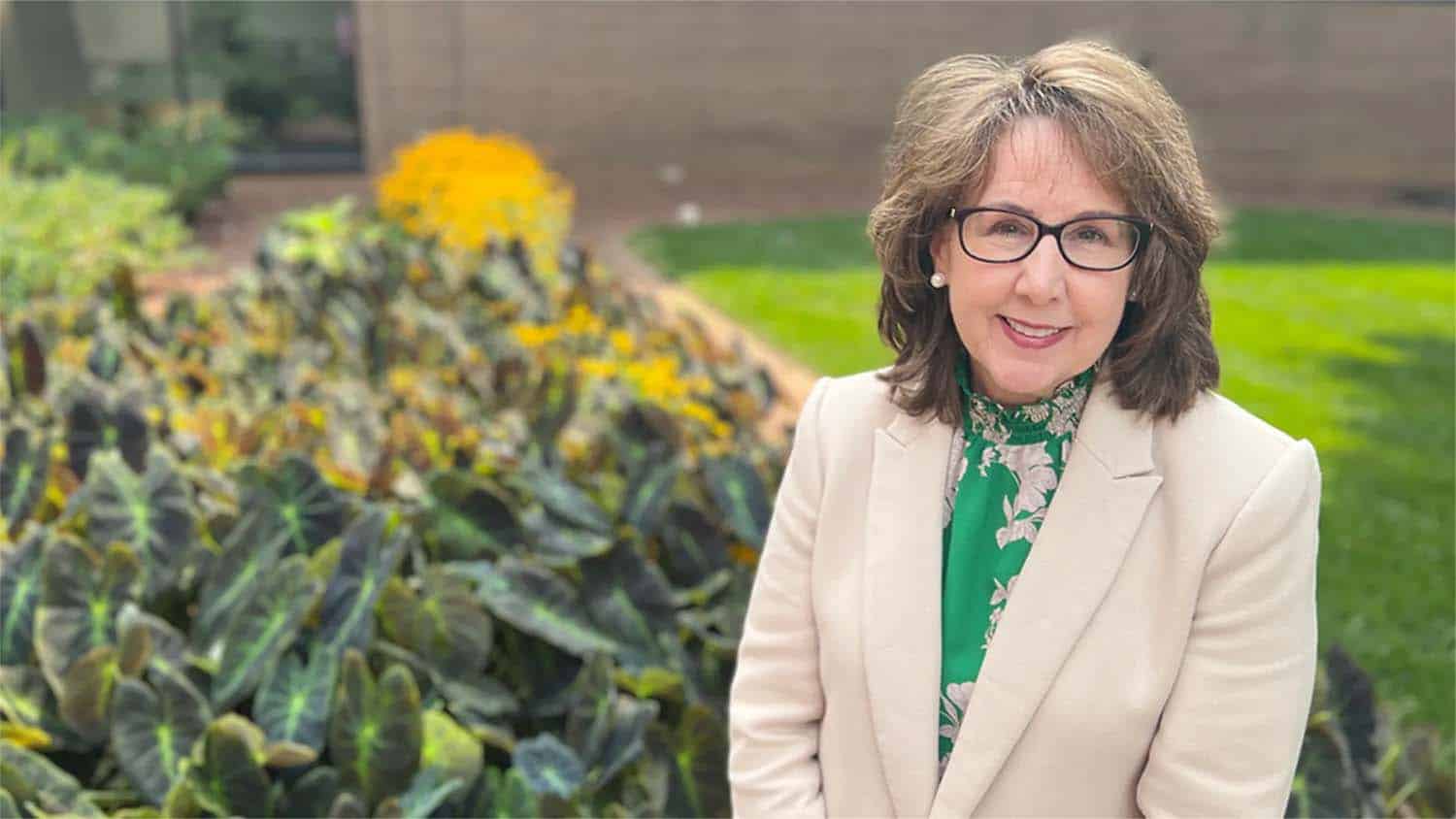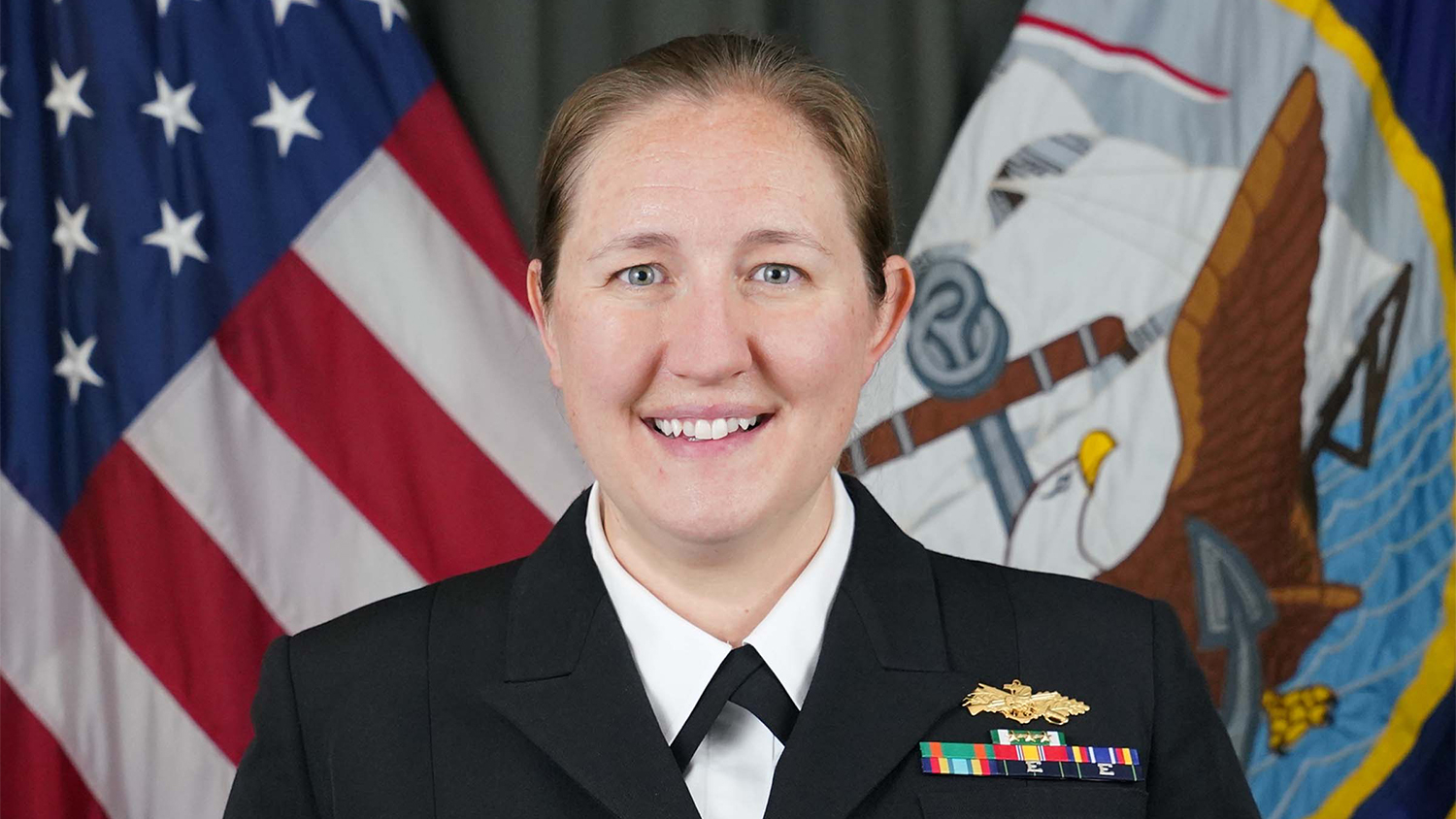A Historic Promotion
NC State alumna Leigh Brady serves as the first female chief executive officer for the State Employees' Credit Union.

Last June, Leigh Walston Brady and her husband Chris went out to run some regular Saturday morning errands: to the garden center, to the grocery store, to the family flower beds.
That’s when she got a call from the chair of the board of directors of the State Employees’ Credit Union for an immediate face-to-face meeting.
“I haven’t had a shower,” she said.
“That’s OK,” was the answer, “come over now.”
At that meeting, the lifelong employee of the nation’s second-largest credit union was offered the chance to become the 2.8 million-member financial cooperative’s first female chief executive officer effective July 1, an elevation long in the making for a proud daughter of North Carolina and member of NC State’s 1987 centennial class.
What in her life has changed since moving from her previous chief operating officer’s role into the C suite overlooking downtown Raleigh?
“Well, I’ve taken a shower every Saturday morning since then,” Brady says, laughing. “You never know what might happen.”
Life does come fast and differently in the CEO’s chair. Brady has learned to be even more prepared every day in the organization where she’s worked for the past 36 years.
I learned early on that there is something different about SECU and its mission, something special about working here.
Brady never set her sights on ascending to the top of the org chart as she worked her way up from being an accounting technician at the 801 Hillsborough Street branch, barely a mile from NC State’s Memorial Tower and about halfway between campus and SECU’s executive building attached to the North Carolina Museum of Natural History on Salisbury Street.
That first job came after she answered a blind newspaper classified ad, not knowing which company had advertised the position.
“I thought I would be here for two years and then move on,” she says. “I learned early on that there is something different about SECU and its mission, something special about working here.”
Throughout her time at SECU, Brady has worked in accounting, audit, loan administration, marketing and corporate training. She started the credit union’s consumer education group and then oversaw human resources, communications and marketing, and the SECU Foundation before taking over as chief operating officer in 2021. Unlike most financial institutions, SECU has a tradition of long-tenured staff and promoting from within, something Brady appreciates from her many different opportunities through the years.
“It taught me the value of the front-line staff and that when provided opportunities, our folks can learn, grow, thrive and give back to SECU in a big way,” she says. “Our people are our secret sauce.”
Membership in the not-for-profit SECU is open to all state of North Carolina employees and immediate family members. All full-time NC State University employees and their families are eligible, with benefits that include favorable mortgage rates, low-interest credit cards, loans and all traditional banking services, along with low or no fees. There are members in all 50 states and dozens of countries around the world.
Like NC State, the credit union has a presence in each of North Carolina’s 100 counties, with a total of 275 branches; some 7,700 full-time employees; another 600 part-time employees, interns and contract workers; and some 3,200 local volunteers.
Originally founded at the height of the Depression to serve state employees and teachers, with 17 inaugural members and $437 in deposits, SECU now has more than $50 billion in assets.
“I was here when we celebrated our first $1 billion,” Brady says. “It was a big deal then, and the organic growth to $50 billion has been amazing.”
A Glass Ceiling Shattered
Taking over the top job at SECU was a big honor for Brady, mainly because of the organization’s tradition of promoting loyal and dedicated employees.
The mother of three adult children — the youngest of whom is currently enrolled in the NC State sports management program and works with the Wolfpack football video support team — never really considered what it meant to be the institution’s first female CEO.
Until she started talking to colleagues and front-line personnel she’s known for many years.
“I do believe I underestimated the importance of this to quite a number of women here,” says Brady, who began her tenure last fall with a statewide listening tour in six cities. “As I went across the state and talked to our female employees and managers, they often say, ‘Thank you for breaking the glass ceiling,’ and ‘Thank you for being a mentor.’ I still receive those today.
“It’s not so much that I felt pride of being the first female CEO, it’s that others — especially those who might work here — take pride in it for me. It was eye-opening.”
Navy Federal, the largest of the nation’s 4,800 credit unions, was also led by a female CEO, Mary McDuffie, until she retired on March 1.
It’s not so much that I felt pride of being the first female CEO, it’s that others — especially those who might work here — take pride in it for me.
Brady admits that while she didn’t graduate at the top of her class at NC State, she worked hard and took on every opportunity SECU presented. She also earned a Master of Business Administration from Meredith College in December 1991.
So if being SECU’s first female CEO paves the way for others to advance in their careers, she’s all for it.
“The fact is, if I can get here, others can for sure,” says Brady, who is the second NC State alumnus to lead the credit union. “It’s not about being the smartest person at a company, but about surrounding yourself with talent and having willingness to work hard in any situation.”
“I think that resonates with any company.”
The climb up that ladder began in her hometown of Wilson, North Carolina, where she attended James B. Hunt Jr. High School. She was also selected for the unique Governor’s School of North Carolina, a summer program for high-achieving students from each of North Carolina’s 100 counties.
Does she have big plans for the organization? Only to embrace the founding values that were established when the credit union was formed in the basement of the Agricultural Building, while also making the necessary tweaks to guide it into the future.
Those are all primary lessons she took with her from her NC State roots — lessons she hopes to convey as an inaugural member of the Poole College of Management’s financial advisory board.
About midway through her NC State studies, Brady enrolled in a cooperative education program in accounting, which was then part of the School of Humanities and Social Sciences. She spent two semesters in the accounting department of a manufacturing company in Spartanburg, South Carolina, giving her real-world experience as she pursued her degree, and teaching her lessons she’s valued ever since.
“NC State pushed me to go outside my comfort zone and to explore possibilities,” she says. “Personally, I think that’s why I am sitting in this position today. To be successful, I believe you need a good work ethic and you need to be open to change. NC State’s co-op program gave me the opportunity to highlight my skill offerings, but also tested my adaptability for change.
“That’s something I’ve tried to bring to every job I’ve had here.”
Not Always an Easy Path
The transition from COO to CEO has not been as easy as just moving to the office next door on the 11th floor of SECU headquarters.
Brady is working to help SECU navigate some needed changes, including technology updates and the introduction of tier-based pricing on consumer loans. That’s the percentage rate charged to members based on credit scores, something that is common among banks and nearly all credit unions but is counter to SECU’s longstanding policy of charging the same rates for all loans.
“The fact is, higher-credit-score members were choosing to take their loan business elsewhere, and we very much want to be able to serve all of our members with the best rates possible,” she says.
Brady contends that SECU needs to be more adaptable, especially coming out of the pandemic shutdowns that wreaked havoc with many customer-based organizations — but without turning its back on the member services that have made it so successful through the years.
So she’s proudly adaptable, even if that’s not always popular.
She’s now trying to navigate bringing different concepts to a necessarily conservative-minded organization, from lending changes to SECU’s first rewards credit card, and eventually to small-business services that have previously been unavailable to the membership.
There are tripwires across the landscape, especially for an organization that strategically has built a strong statewide reputation over nine decades. That reputation is an important foundation, even if it means being comfortable with members shopping elsewhere for more favorable terms or not having SECU as their primary financial institution.
“Our employees don’t receive commissions or bonuses for product sales or penetration, so you will never have to question that what we are recommending to you is the best thing for you,” she says. “That’s something I love about what we do here.”
Brady, 58, can’t say how long she will stay in the CEO’s chair, but she has ideals and ideas she would like to pursue while there.
“This is something I learned from my mom, probably when I started my first job as a babysitter at 13 years old: Leave something better than you found it,” Brady says. “That’s what I intend to do. And that’s what our team intends to do.”
- Categories:


